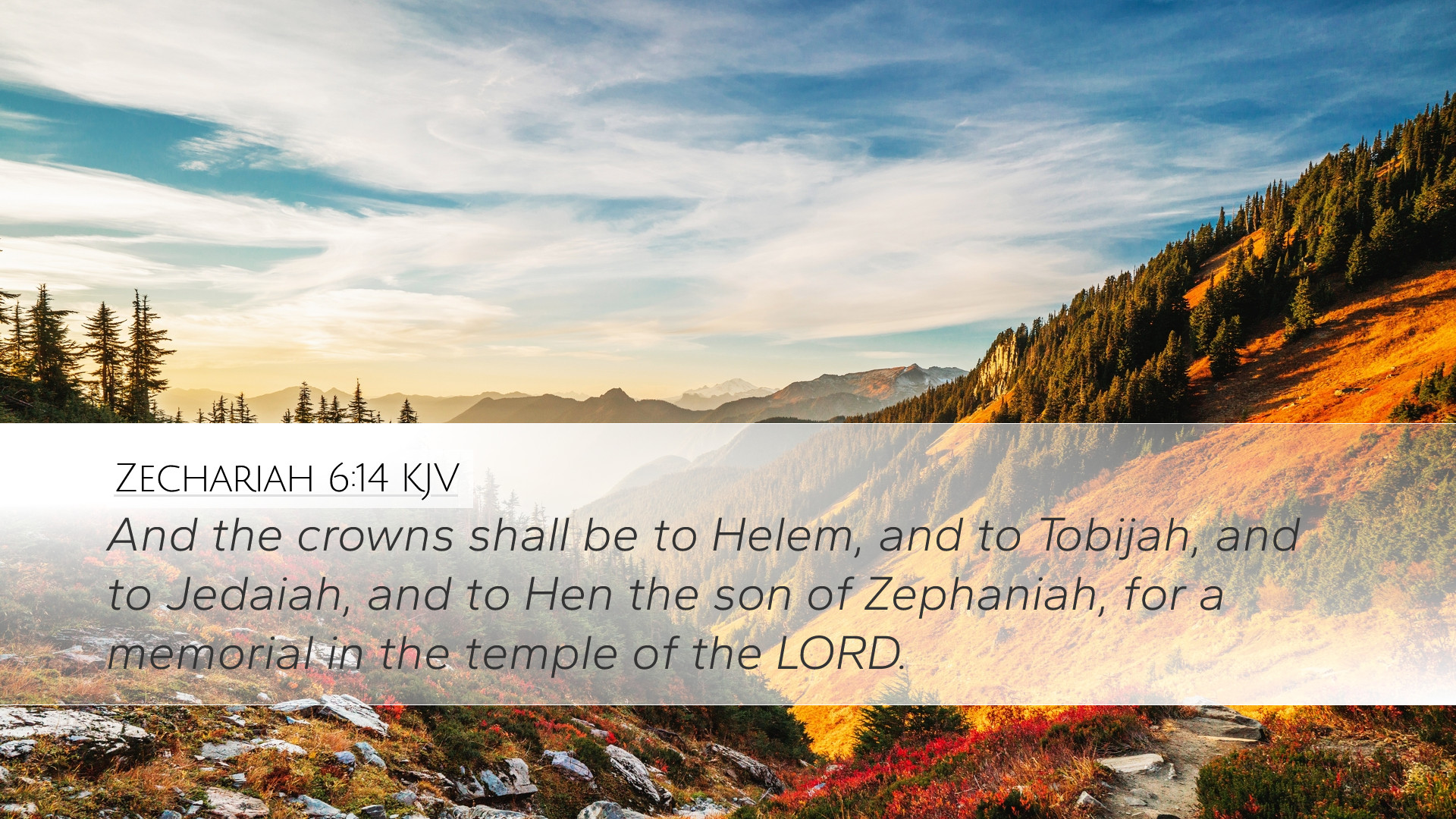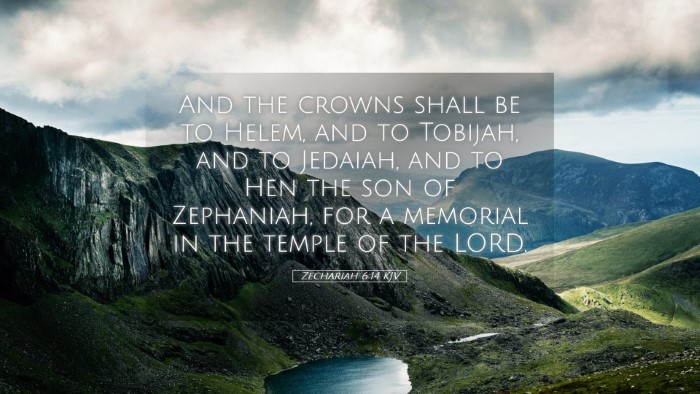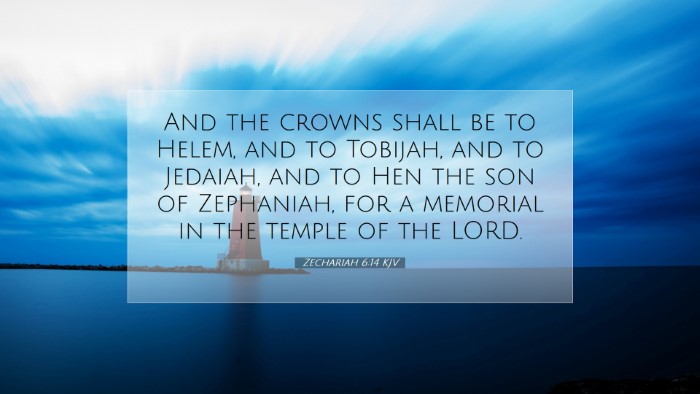Old Testament
Genesis Exodus Leviticus Numbers Deuteronomy Joshua Judges Ruth 1 Samuel 2 Samuel 1 Kings 2 Kings 1 Chronicles 2 Chronicles Ezra Nehemiah Esther Job Psalms Proverbs Ecclesiastes Song of Solomon Isaiah Jeremiah Lamentations Ezekiel Daniel Hosea Joel Amos Obadiah Jonah Micah Nahum Habakkuk Zephaniah Haggai Zechariah MalachiZechariah 6:14
Zechariah 6:14 KJV
And the crowns shall be to Helem, and to Tobijah, and to Jedaiah, and to Hen the son of Zephaniah, for a memorial in the temple of the LORD.
Zechariah 6:14 Bible Commentary
Commentary on Zechariah 6:14
Bible Verse: Zechariah 6:14 - "And the crowns shall be to Helm, and to the house of Josiah the son of Zephaniah, for a memorial in the temple of the Lord."
Introduction
Zechariah 6:14 is a verse that encapsulates significant themes of authority, divine purpose, and the prophetic mission of Israel's restoration. It touches upon the institution of the priestly and kingly roles within the community and how they are intertwined in the person of Joshua the high priest and Zerubbabel the governor. This commentary seeks to summarize insights from key public domain commentaries to present a cohesive understanding of this verse.
Contextual Background
The book of Zechariah, a prophetic work, addresses the concerns of the Jewish people who returned from exile. Zechariah's visions and prophecies are essential to understanding the hope and future of Israel. The sixth chapter concludes with the crowning of Joshua, emphasizing the establishment of God’s covenant. This verse highlights the significance of crowns dedicated to prominent individuals and serves as a testament to the restorative work God is undertaking.
Insights from Commentators
Matthew Henry
Henry emphasizes the symbolic nature of the crowns mentioned in this verse, suggesting that it represents the glory and honor which God places upon those who serve in His temple. He interprets the crowns as not merely ornamental but as signs of God's favor and the fulfillment of His promises. The mention of Helm and Josiah the son of Zephaniah points to the idea that God recognizes and rewards faithful service within His people.
Albert Barnes
Barnes elaborates on the historical significance of the names given in this verse. He notes that these individuals, especially Josiah, represent a lineage that is crucial in the restoration process of Israel. The crowns serve as a commemoration of their roles in the temple, illustrating a union between governance (represented by Zerubbabel) and priesthood (represented by Joshua). This union signifies that in the Messianic age, the roles of king and priest will ultimately converge in the person of Christ.
Adam Clarke
Clarke brings further attention to the eschatological implications of this passage. He discusses how the crowning of these figures can be seen as prophetic foreshadowing of the greater fulfillment in Christ, who is both King and Priest. The crowns are a memorial, indicating that their legacy and work will be remembered in the future, thus encouraging believers to strive for faithfulness in their roles within the body of Christ.
Theological Implications
This verse holds profound theological significance, particularly in understanding the dual roles of Jesus Christ as both King and High Priest. It also illustrates the continuity of God's plan through individuals who follow Him diligently. The act of crowning individuals emphasizes the author's intent to highlight God's sovereignty and the honor bestowed upon those who honor Him.
The Role of Memorials in Worship
Further exploring the concept of memorials, both Barnes and Henry touch on the importance of remembrance in worship. Memorials not only serve as a reminder of what God has accomplished but also inspire future generations to continue in faithfulness. The act of establishing crowns represents a physical token of dedication to God’s covenant and a testimony of His faithfulness to His people.
Application for Today
For pastors, students, and theologians today, Zechariah 6:14 is a reminder of the importance of our roles within the church and the world. Just as Joshua and Zerubbabel were called to lead in their time, so are we called to honor God through our service and witness. The memorial aspect encourages believers to reflect on God's blessings and to share those stories to inspire others.
Conclusion
In summary, Zechariah 6:14 serves as a powerful reminder of God's covenant faithfulness, the intertwining of priestly and kingly roles, and the importance of remembrance in the life of faith. By gleaning insights from the works of Matthew Henry, Albert Barnes, and Adam Clarke, we can gain a deeper understanding of this prophetic message and its implications for the church today.


